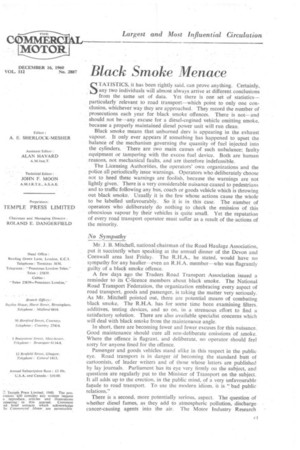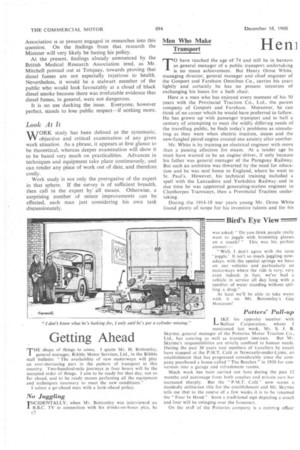Black Smoke Menace
Page 37

Page 38

If you've noticed an error in this article please click here to report it so we can fix it.
STATISTICS, it has been rightly said, can prove anything. Certainly, any two individuals will almost always arrive at different conclusions from the same set of data. Yet there is one set of statistics— particularly relevant to road transport—which point to only one conclusion, whichever way they are approached. They record the number of prosecutions each year for black smoke offences. There is not—and should not be—any excuse for a diesel-engined vehicle emitting smoke, because a properly maintained diesel power unit will run clean.
Black smoke means that unburned dery is appearing in the exhaust vapour. It only ever appears if something has happened to upset the balance of the mechanism governing the quantity of fuel injected into the cylinders. There are two main causes of such unbalance; faulty equipment or tampering with the excess fuel device. Both are human • reasons, not mechanical faults, and are therefore indefensible. The Licensing Authorities, the operators' own, organizations and the • police all periodically issue warnings. Operators who deliberately choose not to heed these warnings are foolish, because the warnings are not lightly given. There is a very considerable nuisance caused to pedestrians and to traffic following any bus, coach or goods vehicle which is throwing out black smoke. Usually it is the few whose actions cause the whole to be labelled unfavourably. So it is in this case. The number of operators who, deliberately do nothing to check the emission of this obnoxious vapour by their vehicles is quite small. Yet the reputation of every road transport operator must suffer as a result of the actions of the minority.
No Sympathy
Mr. J. B. Mitchell, national chairman of the Road Haulage Association, put it succinctly when speaking at the annual dinner of the Devon and Cornwall area last Friday. The R,H.A., he stated, would have no sympathy for any haulier—even an R.H.A. member—who was flagrantly guilty of a black smoke offence.
A few days ago the Traders Road Transport Association issued a reminder to its C-licence members about black. smoke. The National Road Transport Federation, the organization embracing every aspect of road transport, goods and passenger, is taking the matter very seriously. As Mr. Mitchell pointed out, there are potential means of combating black smoke. The R.H.A. has for some time been examining filters. additives, testing devices, and so on, in a strenuous effort to find a satisfactory solution. There are also available specialist concerns which will deal with black smoke from the maintenance angle.
In short, there are becoming fewer and fewer excuses for this nuisance. Good maintenance should cure all non-deliberate emissions of smoke. Where the offence is flagrant, and deliberate, no operator should feel sorry for anyone fined for the offence.
Passenger and goods vehicles stand alike in this respect in the public eye. Road transport is in danger Of becoming the standard butt of cartoonists, of leader writers and of those whose letters are published by lay journals. Parliament has its eye very firmly on the subject, and questions are regularly put to the Minister of Transport on the subject. It all adds up to the erection, in the public mind, of a very unfavourable fgade to road transport. To use the modern idiom, it is "bad public relations."
There is a second, more potentially serious, aspect. The question of whether diesel fumes, as, they add to atmospheric pollution, discharge cancer-causing agents into the air. The Motor Industry Research Association is at present engaged in researches into this question. On the findings from that research the Minister will very likely be basing his policy.
At the present, findings already announced by the British Medical Research Association tend, as Mr. Mitchell pointed out at Torquay, towards proving that diesel fumes are not especially injurious to health. Nevertheless, it would be a stalwart member of the public who would look favourably at a cloud of black diesel smoke because there was irrefutable evidence that diesel fumes, in general, were not dangerous.
It is no use ducking the issue. Everyone, however perfect, stands to lose public respect—if nothing more.
Look At It
WORK study has been defined as the systematic, objective and critical examination of any given work situation. As a phrase, it appears at first glance to be theoretical, whereas deeper examination will show it to be based very much on practicalities. Advances in techniques and equipment take place continuously, and can render any piece of work out of date, and therefore costly.
Work study is not only the prerogative of the expert in that sphere. If the survey is of sufficient breadth, then call in the expert by all means. Otherwise, a surprising number of minor improvements can be effected, each man just considering his own task dispassionately.
























































































































